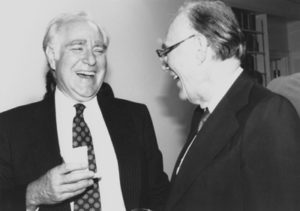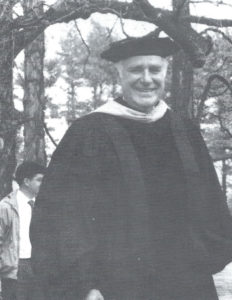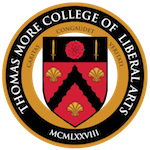William Edmund Fahey, Ph.D.
Fellow & President
It is with great sadness that I convey to the College Community the passing of Peter Vincent Sampo, the first president of Thomas More College of Liberal Arts, and its founder.

I had the fortune of working with Dr. Sampo for two years (2007-2009) prior to his retirement and my becoming the third President. In those two years, I enjoyed and benefitted from attending his Humanities classes and speaking with him privately about ideas, the classroom, and the burdens of office. Circumstances during the College’s transition made it difficult for Dr. Sampo and I to collaborate, yet I always respected his tenacity and determination, and benefitted from his example. Of tremendous benefit, however, was getting to know him through his correspondence, which I read in the first year of my own presidency and continue to read. His founding document of Thomas More College—two single-spaced pages from the winter of 1977-78 entitled “Transforming an Existing Institution,” I read eagerly. I was inspired by his first articulation of what a faculty at a new college should look like and the conditions needed to sustain them: “Helping teachers lead the kind of dedicated life that is needed to teach the liberal arts is a lay community that leads a devotional life in common to some extent. The day would be structured by morning prayer, angelus and vespers as well as Mass. The community would be composed of like-minded people…. Having this type of community helps solve the problem of estrangement of intellectual life from the life of the Church. The gap between intellectuals and parish life has been the cause of many of the problems of the liturgy. The gap can only be closed by those who not only live according to the liturgical year but who take the intellectual life seriously…” Or consider his remark on the essence of the curriculum: “The first purpose of the curriculum is knowledge which results from contemplation. Knowledge of this type is necessary for truly human action.”
When Thomas More College celebrated its fortieth anniversary, these and other early documents of Dr. Sampo and his early colleagues were read by the entire Collegiate community—from the newly-arrived freshmen to veteran trustees. Who was this remarkable man whom I have only been able to receive glimpses of through a few years of working together, from vignettes of friends, and from his correspondence?
 Throughout the 1960s, professor of political science Peter Sampo had watched his country and his profession become captivated with change. A former sailor and devoted American, Sampo had been trained at Notre Dame after his military service and had spent most of his early academic career (1962-1970) at St. Anselm College, where he founded a new department dedicated to exploring the political ideas behind Western Civilization. While living in Manchester, New Hampshire, Sampo befriended John Meehan, also a former military man and teacher, and Francis Boucher, a local businessman. The three looked with sadness on the social upheaval of the 1960s. Dissatisfied with the leadership at St. Anselm College, Sampo resigned his chairmanship and took a position as Dean of St. Francis College, Biddeford, Maine, but left within three years when he discovered that the Franciscans were planning to end the College’s liberal arts tradition and transfer the institution to secular control.
Throughout the 1960s, professor of political science Peter Sampo had watched his country and his profession become captivated with change. A former sailor and devoted American, Sampo had been trained at Notre Dame after his military service and had spent most of his early academic career (1962-1970) at St. Anselm College, where he founded a new department dedicated to exploring the political ideas behind Western Civilization. While living in Manchester, New Hampshire, Sampo befriended John Meehan, also a former military man and teacher, and Francis Boucher, a local businessman. The three looked with sadness on the social upheaval of the 1960s. Dissatisfied with the leadership at St. Anselm College, Sampo resigned his chairmanship and took a position as Dean of St. Francis College, Biddeford, Maine, but left within three years when he discovered that the Franciscans were planning to end the College’s liberal arts tradition and transfer the institution to secular control.
Sampo then returned to Manchester and worked with Meehan and Boucher to pursue their vision of a new, independent Catholic college in New Hampshire. This vision became reality in 1973 with the conception of Magdalen College, of which Peter Sampo was the founding President. The following year, Sampo established a separate collegiate-level summer program to offer, as an early brochure announced, “an introduction to the principles of Catholic collegiate education.” This program was called “Thomas More Collegiate Summer Program for High School Students.” Throughout these and similar initiatives, Peter Sampo continued to reveal his grit and stern independence—the very qualities necessary for founding any movement, community, or school.
By the fall of 1974, Sampo and his two colleagues formally incorporated Magdalen with the State of New Hampshire and opened its doors for operation along Route 3 at a former roadside motel in Bedford, New Hampshire. Sampo departed in 1977, and moved to St. Louis, Missouri, where he became one of the founders of Cardinal Newman College. He worked there with Damian Fedoryka, the successor to Warren Carroll and second president of Christendom College.
Before the 1977-1978 academic year was over, however, Peter Sampo was laying the plans for another founding or re-founding of a Catholic college in New Hampshire. He made overtures privately for returning to Magdalen, while at the same time exploring a way to purchase the then-failing Mount St. Mary’s College in Hooksett, New Hampshire. In his efforts, he received the support of Auxiliary Bishop Mulvee of the Catholic Diocese of Manchester. He then enlisted the assistance of Mary Mumbach, a then-doctoral candidate from the University of Dallas and former colleague from Cardinal Newman College, to become Dean of the new institution. Sampo and Mumbach drafted plans for a new curriculum with the assistance of Donald and Louise Cowan of the University of Dallas (where Donald Cowan was President and Louise Cowan Professor of Literature and Dean of the Braniff Graduate School). In June, the Secretary of State of New Hampshire recognized and approved the “Articles of Agreement” for the Thomas More Foundation, a non-profit organization to offer “religious and educational programs designed to help young men and women.” Shortly thereafter, Dr. Sampo submitted to the New Hampshire Higher Education Commission an application for offering undergraduate instruction.
In September 1978, College-level operations began with residential rooms in the historic district at 93 Concord St., Nashua. Ten students enrolled for the fall. Classes were held at a temporary campus leased within Daniel Webster College’s buildings in Nashua, New Hampshire. The new enterprise was named the Thomas More Institute of Liberal Arts. In 1979, the Secretary of State of New Hampshire recognized and approved amendments to the Thomas More Foundation “Articles of Agreement” to allow “year-long instruction in the arts and sciences.” I recount these details because students and friends often do not see or all too easily forget the labor involved in creating or sustaining a college. The majority of Dr. Sampo’s correspondence takes the form of appeals, financial appeals or appeals to fellow intellectuals to endorse his new college, or to come and visit. These years, and the decades that would follow, were profoundly stressful and required not only commitment to an educational vision and a passion for teaching, but the willingness to risk all and sacrifice personal time, talent, and treasure to make the very classrooms that many teachers look upon as a right. The two autumns I worked with Sampo, he would say the same thing of the students that I suspect he had been saying for years: “It is a miracle that they show up.”
Dr. Sampo had not only tenacity and spirit, but he had a sense of the times, the gravity of the hour. In a letter to Dietrich Von Hildebrand’s widow, during the first year of Thomas More College’s existence, he wrote, “As you know very well, the demise of Catholic liberal arts educational institutions has reached the critical point. Our effort here is simply a single-minded attempt to answer what we perceive to be a serious cultural deficiency.” In another letter of the same period, he says, “I urge speed on all our parts, since it would be harmful of the Church and to civilization to let pass an opportunity to reverse the growing trend of secularization.”

Sampo understood himself as a founder. References to the founders of the United States throughout his letters and in conversation were both a sign of his deep patriotism, and also something deeper still: a sense of vocation. Consider the following words: “The purpose of education basically, is keeping virtue in the people, reminding them of basic fundamentals upon which the nation’s greatness was built.” This little College was no little thing; it was an enterprise critical to sustaining the American Republic. In his final year at Thomas More College, Dr. Sampo spoke often of Washington. I think he was mindful of Washington’s own retirement. I think, too, he understood the strain of a capable man, a man with a legacy and to whom much is owed, stepping down.
But the most vivid memory I have of Dr. Sampo comes from Humanities V. The Prince of Machiavelli was the key book of the week, but at the beginning of the first class, Dr. Sampo opened his worn text and read from Machiavelli’s letter to Francesco Vettori, his patron. This passage is the one I remember him savoring:
On the coming of evening, I return to my house and enter my study; and at the door, I take off the day’s clothing, covered with mud and dust, and put on garments regal and courtly; and reclothed appropriately, I enter the ancient courts of ancient men, where, received by them with affection, I feed on that food which only is mine and which I was born for, where I am not ashamed to speak with them and to ask them the reason for their actions; and they in their kindness answer me; and for four hours of time I do not feel boredom, I forget every trouble, I do not dread poverty, I am not frightened by death; entirely I give myself over to them.
 It was one of those precious moments in a classroom where you knew there was no separation between teacher and text, where time collapsed for a moment. I hope that in some fashion Dr. Sampo can now give himself over entirely to such things; certainly, he poured out his life for the sake of learning, the classroom, and his students. He deserves to put aside the mud and dust of his journey and commune with the wise.
It was one of those precious moments in a classroom where you knew there was no separation between teacher and text, where time collapsed for a moment. I hope that in some fashion Dr. Sampo can now give himself over entirely to such things; certainly, he poured out his life for the sake of learning, the classroom, and his students. He deserves to put aside the mud and dust of his journey and commune with the wise.
The College extends its condolences to his family, to all his friends and former students, and to his colleagues at Magdalen College. Masses were offered for Dr. Sampo in the Thomas More College chapel on Thursday, May 28th and today, Friday, May 29th. I would ask all to remember the soul of Dr. Peter Sampo in their prayers.
